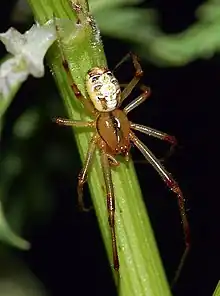Phylloneta
Phylloneta is a genus of comb-footed spiders formerly considered a sub-genus of Allotheridion,[2] and raised to genus status in 2008.[3] The type species was first described by Eugen von Keyserling in 1884 as Theridion pictipes.[4] As of September 2019 it contains three species and two subspecies with a holarctic distribution: P. impressa, P. pictipes, P. sisyphia, P. s. foliifera, and P. s. torandae.[1]
| Phylloneta | |
|---|---|
 | |
| Phylloneta impressa | |
| Scientific classification | |
| Domain: | Eukaryota |
| Kingdom: | Animalia |
| Phylum: | Arthropoda |
| Subphylum: | Chelicerata |
| Class: | Arachnida |
| Order: | Araneae |
| Infraorder: | Araneomorphae |
| Family: | Theridiidae |
| Genus: | Phylloneta Archer, 1950[1] |
| Type species | |
| Theridion pictipes (Keyserling, 1884) | |
| Species | |
| |
See also
References
- "Gen. Phylloneta Archer, 1950". World Spider Catalog Version 20.0. Natural History Museum Bern. 2019. doi:10.24436/2. Retrieved 2019-10-27.
- Archer, A. F. (1950). "A study of theridiid and mimetid spiders with descriptions of new genera and species". Museum Paper, Alabama Museum of Natural History. 30: 1–40.
- Wunderlich, J. (2008). "On extant and fossil (Eocene) European comb-footed spiders (Araneae: Theridiidae), with notes on their subfamilies, and with descriptions of new taxa". Beiträge zur Araneologie. 5: 393.
- Keyserling, E. (1884). Die Spinnen Amerikas II. Theridiidae. p. 64.
Further reading
- Levi, H. W. (1957). "The spider genera Enoplognatha, Theridion, and Paidisca in America north of Mexico (Araneae, Theridiidae)". Bulletin of the American Museum of Natural History. 112: 1–124.
- Le Peru, B. (2011). "The spiders of Europe, a synthesis of data: Volume 1 Atypidae to Theridiidae". Mémoires de la Société Linnéenne de Lyon. 2: 1–522.
- Almquist, S. (2005). "Swedish Araneae, part 1 – families Atypidae to Hahniidae (Linyphiidae excluded)". Insect Systematics & Evolution, Supplement. 62: 1–284.
- Hu, J. L. (2001). Spiders in Qinghai-Tibet Plateau of China. Henan Science and Technology Publishing House.
This article is issued from Wikipedia. The text is licensed under Creative Commons - Attribution - Sharealike. Additional terms may apply for the media files.